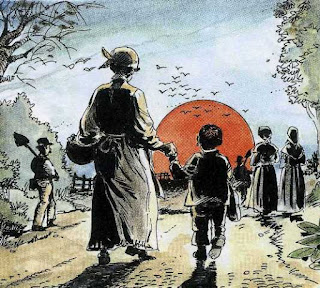From some notes written in January, 1939
Let us open a new and divine world to
many people; let us yield with charitable gentleness to an understanding of the
little, poor and humble ones.
We want to be boiling with Faith and
with charity.
We want to be living saints for
others, and dead to ourselves.
Each of our words must be a breath
from an open heaven: everyone must feel there the flame that burns in our
hearts, and the light of our interior fire, to find Christ and God there.
Our devotion must not leave people
cold and bored, because it must be truly alive and filled with Christ.
Follow in the footsteps of Christ
right up to Calvary, and then rise with Him on the Cross, or die at the foot of
the Cross of love with Him and for Him.
Thirst for martyrdom.
Serve the Son of Man, in men.
To win God and seize others, it is
necessary, first of all, to live an intense life of God in ourselves, to have
within us a dominant Faith, a great ideal which should be a flame which burns
us and shines out - to renounce our very selves for others - to burn our life
in an idea and in a stronger, sacred love. Nobody who obeys two masters - the
senses and the spirit - will ever find the secret of winning souls.
We must say words and create works
which survive us.
Do penance silently and secretly.
Follow your vocation and be faithful
to your Vows.
Be proud of being able to perform the
humblest domestic services.
We must be saints, but become such
saints
that our sanctity does not belong only to the faith of the people, nor
remains only in the Church, but transcends and casts into society such a splendor of light, such a lively love of God and men, to be saints of the
people and the public welfare, more than saints of the Church.
We must be a most profound inspiration
of mystical spirituality which pervades all levels of society: contemplative
and active spirits ‘servants of Christ and of the poor’.
Do not give yourselves up to the
vanities of the arts, nor let yourselves be puffed up by worldly matters.
Communicate with your brothers solely
to edify them, communicate with others solely to spread the goodness of the
Lord:
1) Love Christ in everyone;
2) Serve Christ in the poor;
3) Renew Christ in ourselves and
restore all things in Christ;
4) Save always, save all, save at the
cost of every sacrifice, with redeeming passion and redeeming holocaust.
Great souls and great and generous
hearts; strong and free Christian consciences which sense their mission of
truth, Faith, of high hopes, of holy love of God and men, and in the light of great,
great Faith, really ‘of that’ in Divine Providence, marching without stain or
fear, through fire and water, and also through the slime of so much hypocrisy,
perversity and dissolution.
Let us carry with us, and deep within
us the divine treasure of that charity which is God, and while having to pass
through the people let us keep in our hearts that heavenly silence that no
noise in the world can shatter, and that inviolate cell of a humble
self-knowledge, where the soul speaks with the angels and with Christ Our Lord.
We no longer have the time that has
passed; we cannot be certain of having the time to come; therefore, it is only
this present moment of time that we have, and nothing more.
Around us there is no shortage of
scandals and the false modesty of the Scribes and the Pharisees; nor malevolent
insinuations, calumnies and persecutions.
But, my sons, we must not have time to
‘turn our heads and look back at the plough’, so urgent is our mission of
charity pressing us on, so ardent is our love for our neighbour, so much does
the divine, burning fire of Christ consume us.
We are drunk with charity and fools
for the cross of Christ Crucified.
Train the little ones and the poor to
follow the way of God, above all by a life that is humble, holy and full of
good.
Live in a luminous sphere, drunk with
light and with the divine love of Christ and of the poor, and with heavenly
dew, like the lark soaring and singing in the sun. Let our table be like the
ancient Christian agape.
Souls!
Souls!
Have a great heart and the divine
folly for souls.
On the way with Don Orione, 324-327









